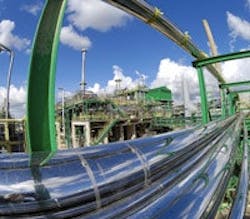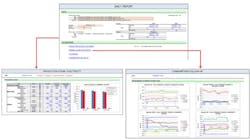One of the world's largest energy companies, Total, Paris, is committed to improving its refineries' energy efficiency, not only to comply with new environmental standards but also to minimize production costs and enhance competitiveness. As part of this effort, the Normandy refinery, Total's largest refinery complex in France and one of the largest in Europe, asked ProSim, Labège, France, to implement its Ariane utilities-management and power-plant-optimization software in the refinery's production system.
In the dynamic environment of a refinery, executing the actions necessary for optimum utilities-system management requires the help of online optimization software. The main objective of implementing Ariane was to provide guidance and practical daily suggestions for optimizing the production of steam, hot water and electricity within the refinery.
Implementation was divided into several essential steps. The first consisted of gathering information on the Normandy refinery and integrating it into the software to build a model. ProSim engineers, together with operators, gathered all the necessary information to map out the site's processes and to identify the degrees of freedom of the plant optimization. The second step involved software integration, i.e., inserting the Ariane model into a larger application that automates the inputs/outputs, and handles user parameters and options management. These steps were completed in late 2011.
Figure 1. This gives summaries of calculations of utilities production and consumption as well as recommendations.
PHILIPPE BAUDET is a process engineer for ProSim, Labège, France. FABIEN JOLY is project manager at Total's Normandy Refinery, Harfleur, France. E-mail them at [email protected] and [email protected].

